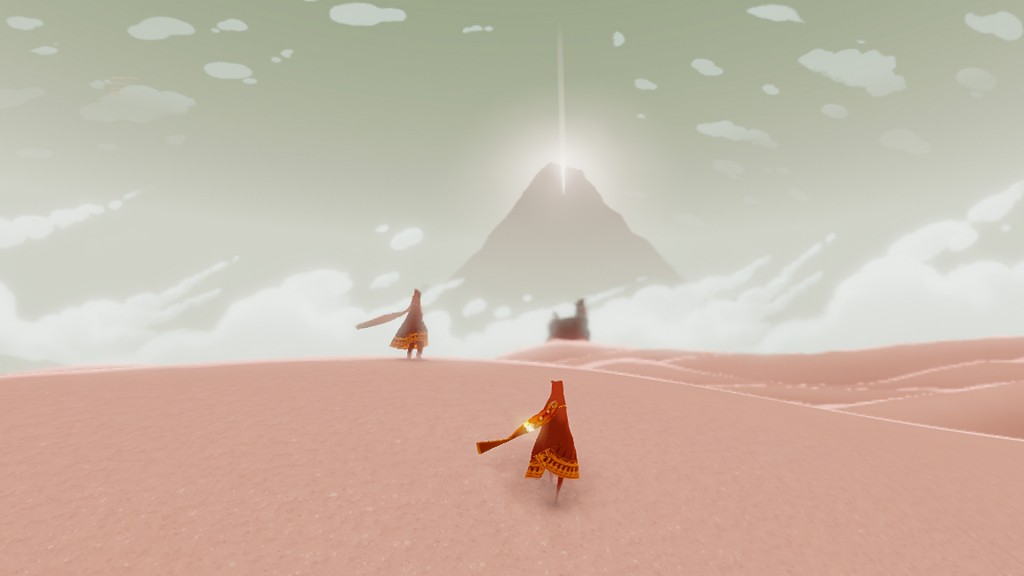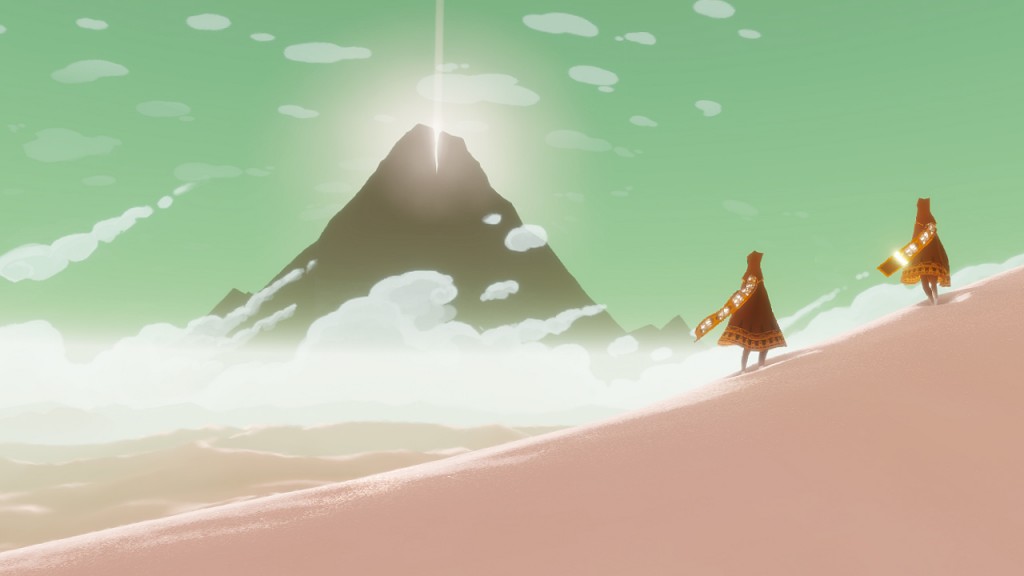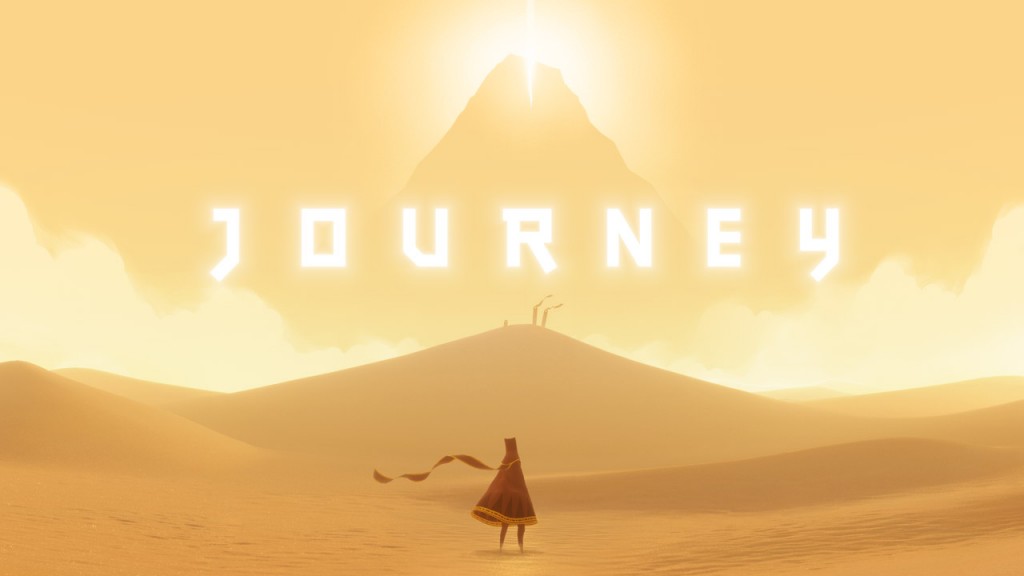How much can we care about a digital companion?
Whole games have been built around this question – most notably 2001 classic Ico, which cast players as a young boy who had to escape a witch’s castle together with a girl named Yorda. Together, the two made a team: Yorda was frail, but she was the only one who could open the castle’s magically sealed doors. And it worked: Ico is one of my all-time favourites. Subsequent games – such as the modern Princes of Persia – ran with this idea, but implemented it the same way: your companion was always computer-controlled, and there was a gameplay reason you needed to work with her (for good measure, it was always a her). Thatgamecompany’s Journey is the latest game to tackle this question… but this time, it puts its own spin on the formula.
In Journey, you play a cloaked traveller who has to cross the desert to reach a distant mountain. There is no dialogue, no narrative, and no exposition. Who is the traveller? The answer seems to be “a pilgrim”, but this isn’t stated outright anywhere – it’s something I deduced. Is the pilgrim a he, a she, or an it? I imagined my pilgrim as a she, but that was pure whimsy. Did she have family or friends before deciding to cross the desert? Who knows. Journey’s gameplay mechanics are equally minimalistic: mostly, the pilgrim walks towards her destination. She can use the magic in her scarf to jump or fly, and she can recharge her scarf by chirping musically when standing near bits of cloth scattered throughout the world – streamers, banners, magic carpets, and the like. This is pleasant enough – controlling the pilgrim is smooth and fluid, whether she’s on the sand or soaring through the air – but that’s about it as far as game mechanics go. There is no real challenge, except for looking/walking around, wondering where to go next. There are neither puzzles nor combat. There isn’t even a Game Over screen – it is impossible to die. The overall game is quite short, just a couple of hours. In this regard, Journey feels a lot like thatgamecompany’s previous title, Flower.

However, where Flower – with its emphasis on healing the world – was clearly inspired by Clover’s Okami, Journey patterns itself after Ico. It’s possible to play alone, in which case Journey becomes a mystical, and very pretty, metaphor for… well, whatever the player wants. (My own interpretation would be a spoiler!) But upon connecting to the Playstation Network, this changes – Journey will pair you up, randomly, with another pilgrim somewhere in the world. Unlike Ico and its ilk, your fellow traveller is controlled by another human being, and unlike Ico, there is absolutely no need to cooperate. Remember – no puzzles, no combat, and no game over. Sticking close by the other pilgrim will regenerate the magic in both your scarves, but this is hardly necessary – I didn’t even realise this bonus existed until I looked up a FAQ near the end of the game!
The triumph of Journey is that even though I didn’t need the company, I wanted it. I knew nothing about the other players I met, and – a little like Demon’s/Dark Souls – the game offers almost no way to communicate, save for the pilgrim’s simple chirp. Yet it felt good simply having someone else around – and evidently, the other players I met felt the same way! If one of us dropped behind, the other would often stop and wait, chirping. If I wasn’t sure where to go, well, it felt better to tag along than to roam around by myself. Sometimes one of us would chirp as we jumped or trudged along, and the other person would chirp back. Cheerfully? Sociably? Good-naturedly? The absence of words is an inspired design decision, because it means we see what we want to see – and in my fellow travellers, I saw the same camaraderie and affection that I felt for them.

Ultimately, Journey is an interesting experiment in game design – or perhaps I should say, in interactive art design. It didn’t quite live up to the hype for me; while I certainly enjoyed it, I was never moved to the same emotional height as other reviewers. But it’s still very much worth a shot. Journey conveys a unique, positive experience, both single-player and online, with the latter also fostering a sense of interpersonal “connection” (per the developers). I would recommend Journey if it were just a short, sweet breath of fresh air. The potential for it to be more, should it strike a chord with you, is icing on the cake.
Resources
Buy the collector’s edition (including Flow, Flower, Journey, soundtracks, and other goodies) from Amazon.com
Dualshockers interview with thatgamecompany co-founder Jenova Chen (SPOILER WARNING)
Another interview with Jenova Chen, this one from Gamasutra (spoilers again)
Yet another interview, with thatgamecompany co-founder Kellee Santiago (more spoilers)
This webcomic take on the game is not only apt, but made me laugh
I sourced the screenshots in this piece from the game’s official website: http://thatgamecompany.com/games/journey/.
Discover more from Matchsticks for my Eyes
Subscribe to get the latest posts sent to your email.

Wow, that sounds like a really unique and amazing game. I hadn’t heard of it but I’ll have to track down a copy of it now.
It’s definitely worth checking out! :D There’s a demo available on the Playstation Network so you can try before you buy. If you do decide to go ahead, you can either buy the boxed Amazon collector’s edition I linked above (3 games in one), or buy Journey separately via the Playstation Network. I hope you enjoy it!
Thanks for the info, I just recently got a Playstation 3 so I’ll check it out.
I’ve heard of this game and after reading this, I really want to play it now. Being a beginning gamer, unfortunately, I don’t have a PS3, but thanks for the well-written review. Since you write about textual literature as well as anime, tv, and gaming, I’m wondering whether you’ve heard about the theory of “imagined communities”? It was first used about connections established by print technology, but your emphasis in the review on Journey really made me think of another version of that. Sorry to go all academic in the comments, and thanks again!
Thanks for your comment, SMZ, and no worries! I’m afraid I haven’t heard of the concept until now, but I’ll be sure to look it up. Thanks for bringing it to my attention!